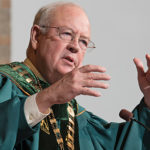A century from now, Mexico will be America’s primary competition for superpower status. We will have defeated Japan and Turkey in the next world war; our chief global ally will be Poland. Battle stars in space will protect us from our enemies, while solar energy transmitted via satellite will replace hydrocarbons, and robots will serve our personal needs.
Such may be the shape of the 21st century, according to George Friedman’s bestseller, The Next 100 Years. Friedman is the founder and CEO of Stratfor, one of the pre-eminent global forecasting companies in the world. He practices “geopolitics,” an academic discipline that assumes nations act in their own self-interest in responding to constraints placed upon them by their geography, economics, and culture and by the actions of others.
Friedman believes America is in our fifth 50-year cycle. Our culture first was dominated by wealthy landowners; then by frontier pioneers; then by small towns settled by these pioneers; and then by large cities as small-town residents pursued employment. Now, we are in a suburban phase made possible by interstate highways and high-speed freeways.
Where will this cycle take us? While Friedman makes some fascinating global predictions, I will focus on three assertions that directly affect our Christian mission.
First, Friedman believes America will continue our global superpower status. Unlike other nations, we dominate our continent without fear of invasion or competition. We are the only country in history to control all the world’s oceans, a fact that leads to our unquestioned military superiority. Our engagement in Iraq and Afghanistan will prevent radical Muslims from forming a regional power to threaten our status.
We will create new forms of energy, countering the effects of global climate change. And we will dominate space, strengthening our military defense and global power. If this scenario comes to pass, our self-reliant spirit will become an even more challenging obstacle to spiritual renewal in our nation.
Second, population growth will reverse, with transforming effect. Having a large number of children was advantageous when they worked to support the family. Now, children cost more than they produce, drastically reducing the size of families and the mother’s primary role as homemaker. This century will see a further breakdown in the fabric of the traditional family as our culture becomes even more secularized. In response, Christians must redouble our work in teaching and modeling biblical morality.
Third, immigration will transform America, especially in its southern regions. As our population decreases and ages, we will depend increasingly on immigrant workers, primarily from Mexico. While our political border with Mexico will remain, our cultural border will move north. If this prediction comes to pass, Texas Baptists’ outreach to our Hispanic neighbors will become even more urgent.
Our best response to an uncertain future is to pray and work for an awakening that will bring spiritual renewal to our self-sufficient, secularized, demographically shifting culture. Friedman may be wrong, but Jesus was right: We are “the light of the world” (Matthew 5:14).
Sign up for our weekly edition and get all our headlines in your inbox on Thursdays
Jim Denison is president of the Center for Informed Faith (www.informedfaith.com) and theologian-in-residence with the Baptist General Convention of Texas.














We seek to connect God’s story and God’s people around the world. To learn more about God’s story, click here.
Send comments and feedback to Eric Black, our editor. For comments to be published, please specify “letter to the editor.” Maximum length for publication is 300 words.